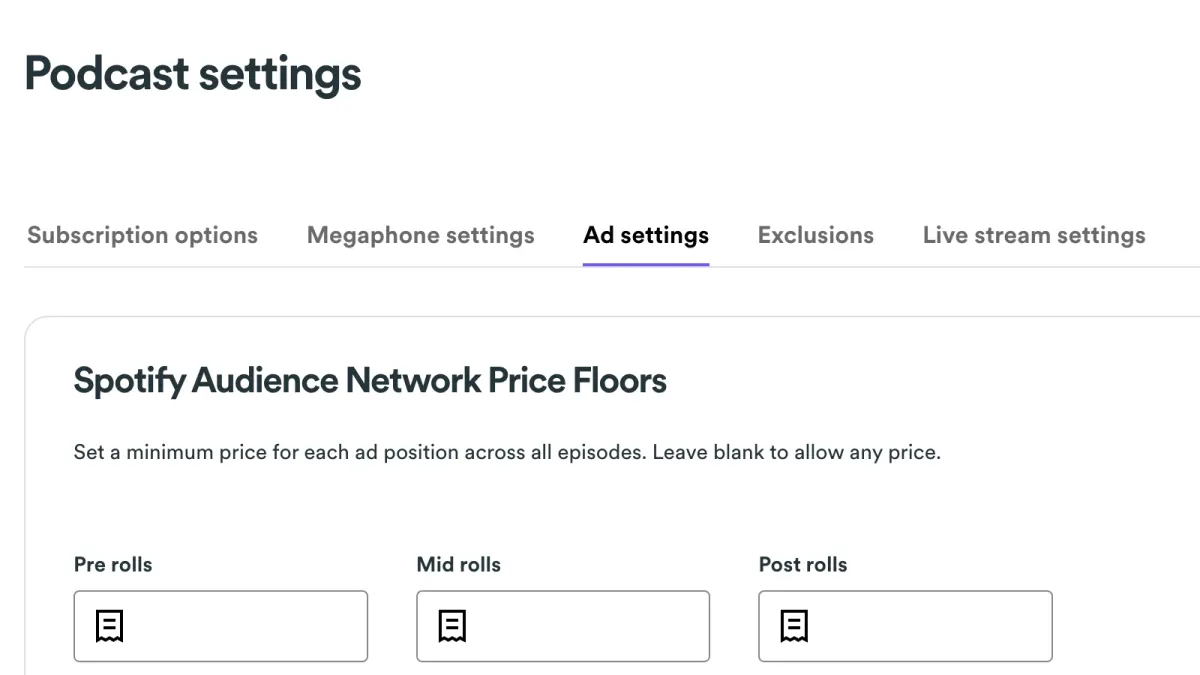
Spotify last week announced an update to its advertising platform, the Spotify Audience Network (SPAN), specifically impacting Megaphone publishers. The update concerns the ability to set price floors for ad placements within podcasts.
Price floors are a concept used in programmatic advertising, where publishers set a minimum acceptable price for their ad inventory. This ensures that advertisers don't win bids below a certain threshold, potentially protecting the publisher's revenue. Price floors can be a useful tool for publishers who have a good understanding of their audience and the value of their ad inventory.
Previously, Megaphone publishers using the Spotify Audience Network could set price floors for their ad placements. However, this functionality will be discontinued effective July 1, 2024.
In the announcement, Spotify stated its belief that removing price floors will ultimately benefit Megaphone publishers. They reason that the increased demand for ad space on the Spotify Audience Network, which has grown by 60% since its launch in 2021, will lead to higher potential revenue for publishers. Spotify highlights the access to "premium demand" from major advertisers as a key benefit.
While the removal of price floors could potentially lead to higher revenue for some publishers, it also introduces an element of uncertainty. Publishers will no longer have the same level of control over their minimum acceptable price for ad placements.
To mitigate the potential impact and offer publishers more control, Spotify is introducing a new "direct-only" ad source selection option. This allows publishers to prioritize their direct sales efforts by filling ad placements exclusively with their own campaigns. This functionality provides publishers with more flexibility to manage inventory and potentially maximize revenue based on performance.
The removal of price floors for Megaphone publishers on the Spotify Audience Network is a significant change that will take effect on July 1, 2024. While Spotify believes this will lead to greater revenue opportunities, publishers will need to adapt their monetization strategies and carefully consider the potential impact on their income. The introduction of the "direct-only" ad source selection offers some flexibility to mitigate potential downsides.
Megaphone: a history of Podcast innovation and acquisition by Spotify
Megaphone's story starts in 2015 as Panoply, a company launched by The Slate Group. Initially, Panoply focused on producing podcasts for high-profile media brands like BuzzFeed, The Wall Street Journal, and Vox.
Early Days and Rebranding (2015-2019):
- February 2015: The Slate Group launches Panoply.
- Early 2019: Panoply spins off Pinna, a separate company owned by the same parent company, Graham Holdings.
Shifting Focus and Acquisition by Spotify (2019-2020):
- 2019: Panoply rebrands as Megaphone, signaling a shift towards becoming a podcast advertising and publishing platform.
- November 10, 2020: Spotify announces its intent to acquire Megaphone from Graham Holdings for $235 million. This move aimed to strengthen Spotify's position in the growing podcast market, particularly in the area of podcast advertising.
- December 2020: The acquisition of Megaphone by Spotify is finalized.
Since the acquisition, Megaphone has continued to operate as a subsidiary of Spotify, but it's fully integrated into Spotify's advertising platform, the Spotify Audience Network (SPAN). This integration allows Megaphone publishers to reach a wider audience and potentially earn more revenue through podcast advertising.
The acquisition of Megaphone by Spotify was a significant development in the podcast industry. It highlighted the growing importance of podcast advertising and Spotify's commitment to becoming a major player in this space. Megaphone's expertise in podcast advertising, combined with Spotify's vast audience reach, has the potential to further propel the growth of podcasting as a mainstream medium.

